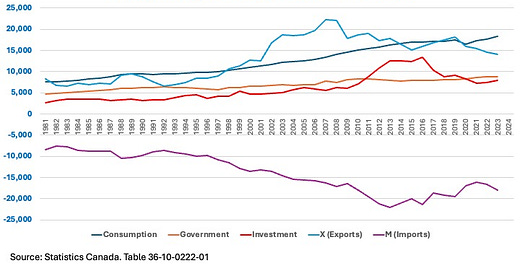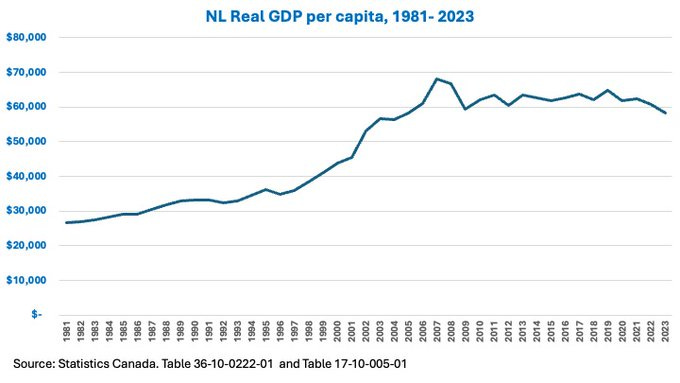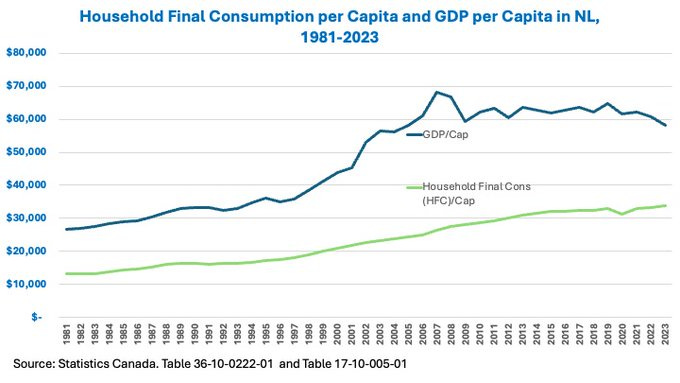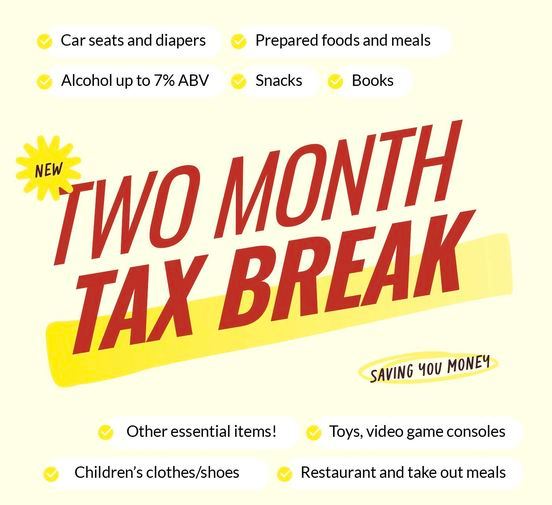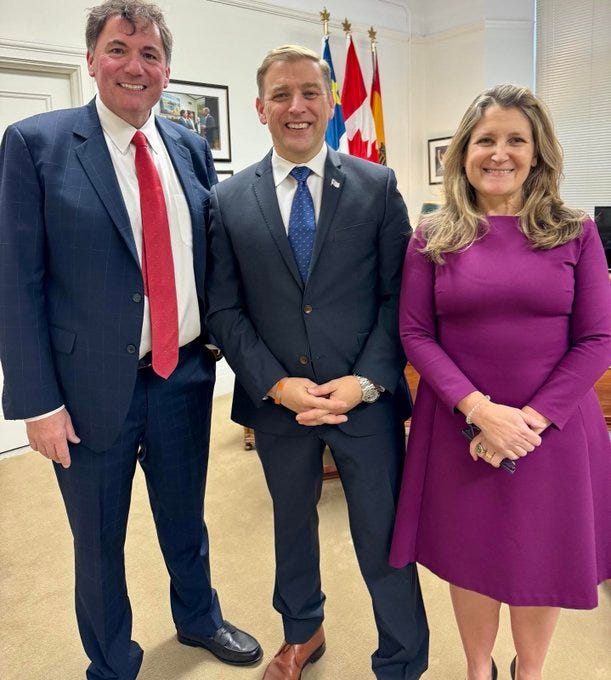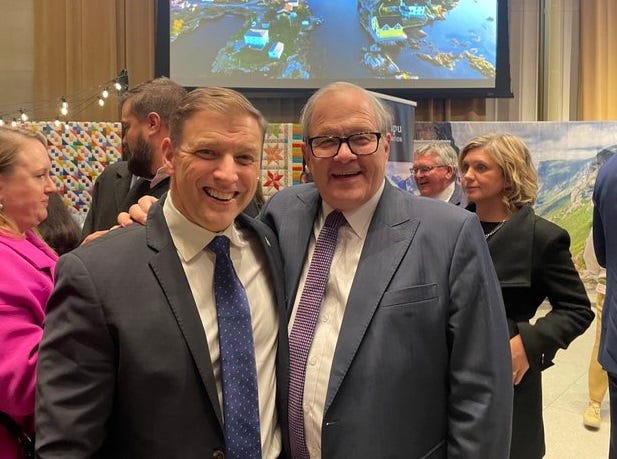Terra Nova oil field reportedly up for sale.
Second year in a row when no companies bid anything at all for future exploration rights offshore.
And Bay du Nord is nowhere near a definitely-gonna-happen done deal.
Restaurants closing or seriously changing their business model.
Government grant vampire John Risley bails on the hydrogen deal he sold Andrew Furey on and now wants to mine bitcoin or AI or some other fly-by-night scheme. All that’s left of hydrogen is a few more equally skeety proposals and all the real prospects for actual, viable wind energy were shut down by the provincial government for no good reason.
The northeast Avalon is doing okay for now, propped up by government spending and what’s left of the oil industry. But with oil diminishing and government spending built to an unhealthy degree on oil, debt, and federal handouts - all notoriously unreliable and unpredictable and therefore expensive - even that’s not really all that good.
And the government has no idea what to do with the economy as shown by the speed with which Andrew Furey bought into the latest federal government brainfart of a Christmas HST holiday. Furey dropped into Ottawa for a quick selfie with Dom LeBlanc and Chrystia Freeland to announce the GST/HST foolishness before heading to the Newfie shed party in Ottawa and then Toronto for a quick selfie at the Taylor Swift concert.
Become a Bond Papers subscriber.
This is not one of those columns where there’s a series of points leading to a clear conclusion. The points at the first are just things that came into the news in the past couple of weeks. They suggest that maybe things are not as rosy as some assume and certainly in the near future things won’t be picking up. The oil thing in particular makes things look particularly bleak, longer term.
There are a couple of other signs people hold up in support of the view things are going well and looking better. The housing market is going gangbusters, supposedly, for one. Well, sure. In metro St. John’s. But check in other parts of the province and you won’t find stories and prices like the ones for the northeast Avalon. And, while new home construction looks great if you say it is up this percentage or that, the actual number of starts isn’t anything to write home about considering it is maybe 10-15% of what’s needed. No one has a clue how to change that.
Same thing with employment numbers. Very good on the northeast Avalon. Double digits in other places.
All the same, the charts reproduced here tell a different long-term story than doom. They are from Doug May, a retired economist who took some Statistics Canada data and tossed out some observations and rhetorical questions last week.
Never better off is the way Doug put it and he’s right. Real GDP per capita means the value of goods and services produced in the province compared using a constant dollar value. In this case, everything is presented using 2017 as the base year. In other words, the figure for 1981 is what it would have been worth in 2017 dollars, taking account of inflation.
In the chart immediately below, you can see a big peak in 2006 and 2007 - all due to the price of oil - and then it tails off somewhat. It’s floating above $60,000 per person for each person alive in Newfoundland and Labrador. That’s the “per capita” or per head part. You can see this rapid climb all through the late 1990s and really that’s because of the general economic good times across the globe in the 1990s and into the 2000s. But it is historically huge in Newfoundland and Labrador m
You can really see why that’s important when you look at the Scooby Doo green line in Doug’s other chart (below}. That green line is Household Final Consumption per person, or what households are spending on all goods and services. They spend more because they have more. As Doug says, folks here have never been better off. But, as he puts it: “why do so many not feel that way?”
Good question. Part of it - as two economists explained to David Herle last week - is that inflation has slowed but prices are still higher than they were a few years ago. Even though incomes have grown faster than prices across Canada, folks feel like they haven’t been keeping pace. They said this *before* the two month tax holiday, by the by.
One of the reasons why folks don’t feel things are going all that well has to do with the distribution of that per capita household income, which is something both Armine Yalnizyan and Jim Stanford talk about roughly 35 minutes into the panel discussion. And as Yalnizyan notes, the sort of fixes politicians tend to go for to deal with the distribution are ones she describes as “narratives” or a clever little story that usually goes something like “let me give you your money back.” Cutting taxes when the population is aging is “Crazy Town” as Yalnizyan puts it, and remember she said that *before* Andrew Furey and Justin Trudeau decided on an HST/GST cut. Piling up debt is crazy too.
In other words, as a number of critics of the tax cut have said since Thursday afternoon, there are ways to deal with affordability, income disparity, and the like but it takes serious action not stuff that is getting sold, quite literally, with graphics that look like they were from some big sale at The Brick to move a backlog of mattresses.
There are so many things fundamentally wrong with this scheme that it’s hard to know where to begin. For governments concerned about health care and for a provincial government with a sugar tax of its own on some beverages, it is just stupid to cut taxes on junk food and candy even if it is only for two months. And bear in mind, the British government already found how hard it is to influence sugar consumption through taxes. They tried a far more sophisticated approach than the one Andrew Furey slapped in place and they actually drove up consumption of sugary drinks. Still making junk food easier to buy runs against government goals.
Cutting the HST on diapers is good, as far as it goes, but that actually should be a policy initiative to permanently axe that tax much like cutting the tax on menstrual products. Taxing books is still stupid and that’s another long-term policy change to encourage reading and boost the domestic publishing industry. Overall, though, these tax-cuts are just quick announcements that make it look like something good is happening but inevitably it causes more problems than it solves.
And if the Liberals think they’ll get any political credit for this or any of their other pre-election spending, they can guess again. Folks have made up their minds. They’ll take the cash or the PET scanner and still vote against you. Did it to the Pea Seas and the Harper Cons. Did it to the Liberals before and they’ll do it again.
In the end this column links back to Friday’s offering that we have a lot of busy-ness in government but it doesn’t add up to much. There’s no coherence to what the government is doing, federally or provincially. That’s the worrying thing. And Thursday’s announcement - which dropped around the time I put the finishing touches on the Friday column - turned out to be a point in support of my argument I could not have made better myself.
Even if those five or six things at the start of this column turn out to be nothing, we *are* headed into potentially rough times. That Andrew Furey took time from his galivanting to Ottawa and Taylor Swift to agree with his fellow Premiers on the need for a bilateral trade deal with the United States in place of the current three-way deal including Mexico just adds even more weight to the argument there are no grownups running our country. We could add in the lack of interest in this province with free trade between Canadian provinces.
But on that US deal, understand that cutting a two way deal with the US and separately with Mexico, if we could, doesn’t make things better for Canadians. It increases the incentive for Canadian companies to relocate to the United States and trade with two smaller economies from the bigger one in the middle.
For Newfoundland and Labrador, the United States is already our single largest trading partner outside Canada. But our exports to the European Union and Britain are almost twice as much. It makes more sense for us to strengthen our ties with Europe and look to improve Newfoundland and Labrador’s position as strategically important between North America and Europe.
With an election coming just imagine if the parties in Newfoundland and Labrador tried speaking about big issues and big ideas in a grown up way for a change. It’s harder than taking selfies but frankly, it’s what people have expected from their political leaders for years.

